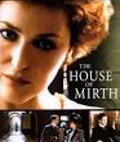
Directed by
Terence Davies
135 minutes
Rated M
Reviewed by
Bernard Hemingway

The House Of Mirth
Synopsis: New York socialite Lily Bart (Gillian Anderson) lives on a small income and the generosity of her wealthy aunt. Although in love with lawyer Lawrence Seiden (Eric Stoltz) she flirts with the idea of marrying serious money. Her flirtations however lead to her ostracism.The House Of Mirth has received a fairly comprehensive drubbing from the critics. Don't let that put you off. There are enough bad movies around without having to blacklist this one. In fact I'd say go and see it. It's a refreshing change from the in-your-face action, urban grime and comedic grossness which accounts for most films these days. Taken from the novel of the same name by turn-of-the-century American author, Edith Wharton, finely scripted by director Terence Davies it's wonderfully wordy in a Wildean way with wit and sardonicism galore. Such style, it seems, was comme il faut for the idle rich in Edwardian New York. And a thoroughly unlikeable lot they were, at least in the (ironically-named) House Of Mirth. Being part of that scene,it is not easy to sympathise with the heroine, Lily, as she finally has to face up to working for a living, but as Gillan Anderson plays her, compared to her peers, she's an angel. As one of her erstwhile friends says, reflecting on their milieu and society in general: "The world is vile".
Anderson is the strongest card here. Some may know her from The X Files but I am not one of them. Rarely off screen she works hard throughout the 148 minutes, balancing the mix of verbal artifice and cool vulnerability with winning grace. Perhaps there's a little too much heaving bosom but then that was, I suppose, the expected body language for women of the time.
If Anderson was an unusual choice there are some other casting oddities that are not so successful. Watching Dan Ackroyd play a pillar of society I couldn't help but think of his 80s comedy performances, and Eric Stoltz as the fatally urbane playboy just didn't convince whilst Anthony La Paglia comes across as a slightly larger Danny de Vito. This casting incongruity seems to be a major sticking point with the aforesaid critics. Yet for me it seemed to work in the film's favour. It felt like one of those classic West End plays (like Lady Windermere's Fan) with a celebrity, rather than strictly thespian, cast. After all, Wharton's novel, for all its verbal cleverness is a genre work in the "fallen woman " tradition (forgive me Wharton fans). Watching these actors, who are infinitely more familiar with contemporary styles of performance, playing these historical parts I found enormously entertaining and more satisfying than Martin Scorsese's Wharton adaptation, The Age Of Innocence.
No doubt this somewhat perverse perspective is far from the director's intention for there is a palpable sense of love for his project. The production is quite lavish with excellent costume and set design evidencing a desire to be true to the era. Editing, however, is sometimes clunky, (even bordering on the discontinuous at one point) and anyone in a get-on-with-it mood may find it unnecessarily detailed. Call me simple-minded but I loved it. Decide for yourself.

Want more about this film?


Want something different?




